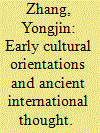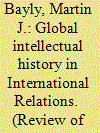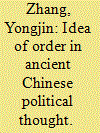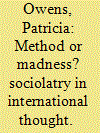|
|
|
Sort Order |
|
|
|
Items / Page
|
|
|
|
|
|
|
| Srl | Item |
| 1 |
ID:
191609


|
|
|
|
|
| Summary/Abstract |
Redressing the dearth of women’s voices in the historiography of international thought is a process now well underway. This worthy recipient of the Joseph Fletcher Prize for Best Edited Book in Historical International Relations in 2021 is the most recent, and one of the most powerful contributions to this enterprise. It furnishes the discipline of International Relations (IR) with accounts of eighteen women who contributed to the history of the international. Moreover, in incorporating these voices into the history of international thought, the volume necessarily introduces contentious methodological claims about what ‘international thought’ is, and how the discipline of IR carves out its intellectual terrain. Owens’ and Rietzler’s volume then, delivers twice—not only by providing a rich historical account of women’s international thinking, but also by showcasing the wide array of practices, locations, forms and modes through which the international has been constructed and contested, thereby challenging long held disciplinary assumptions and intellectual traditions.
|
|
|
|
|
|
|
|
|
|
|
|
|
|
|
|
| 2 |
ID:
191610


|
|
|
|
|
| Summary/Abstract |
Of the thousands of references to historical figures across sixty disciplinary and intellectual histories of International Relations (IR) published since 1929, Patricia Owens (Citation2018) found only 2.94 percent referred to women—79 individuals across the entire trajectory of international thought. Women’s International Thought: A New History, edited by Owens and Katharina Rietzler, is a first corrective to this disciplinary exclusion, pulling back a strip of lacklustre wallpaper to reveal a far more interesting pattern beneath. The book’s promise is two-fold: to begin to remedy the erasure of women from the disciplinary history of IR, and to expand the scope of what constitutes international thinking. Its contributions reveal a diverse array of thinkers, whose restitution enriches the discipline, and could have ripple effects in the world of contemporary IR practice. The volume’s fifteen chapters profile women from academia, policy, advocacy, and journalism, but point beyond these individual thinkers to new themes and paths other researchers will inevitably take up.
|
|
|
|
|
|
|
|
|
|
|
|
|
|
|
|
| 3 |
ID:
141222


|
|
|
|
|
| Summary/Abstract |
A short commentary on Martin Wight’s ‘The Disunity of Mankind’, a short and unfinished piece in which Wight focuses almost exclusively on the Western tradition of thought, from Plato and Aristotle, to the Stoics and to Augustine.
|
|
|
|
|
|
|
|
|
|
|
|
|
|
|
|
| 4 |
ID:
192315


|
|
|
|
|
| Summary/Abstract |
The Eurocentric critique of the International Relations discipline has brought welcome attention to non-European international thinkers, and anti-colonial or anti-imperial thinkers in particular. Frequently these thinkers and associated movements are rightly described in thematic terms of emancipation, equality, and justice, in opposition to the hierarchical worldview of empires and their acolytes. Notwithstanding the broad validity of this depiction, a purely oppositional picture risks obscuring those aspects of ‘non-European’ international thought that evade simple categorisation. Drawing upon archival material and historical works, this article applies approaches offered by global intellectual history to the works of late colonial Indian international thinkers, exploring the mixed registers of equality and hierarchy, internationalism and imperialism present in their writings. Concentrating on three ‘sites’ connected by the common themes of diaspora and mobility: the plight of Indians overseas in East Africa; the concept of ‘greater India’; and the international political thought of Benoy Kumar Sarkar, the article complicates the internationalism/imperialism divide of the early twentieth century, showing how ostensibly opposed scholarly communities sometimes competed over similar forms of knowledge and ways of ordering the world. This offers a framework by which the contributions of global intellectual history can be applied to the study of international political thought.
|
|
|
|
|
|
|
|
|
|
|
|
|
|
|
|
| 5 |
ID:
131421


|
|
|
|
|
| Publication |
2014.
|
| Summary/Abstract |
Is there any significant International Thought in antiquity beyond the West? If there is, why has there as yet been no meaningful conversation between the expanding enterprise of theorizing International Relations (IR) today and ancient Chinese political thought? This extended version of my Martin Wight Memorial Lecture addresses these questions through a critical exploration of how a pivotal idea in ancient as well as contemporary international relations, namely, the idea of order, is deliberated in ancient Chinese political thought. Inspired by Martin Wight's profound scholarship so steeped in historical and philosophical depth, it investigates why and how alternative visions of moral, social and political order are imagined, offered and debated in ancient Chinese philosophical discourse. It examines the ways in which the moral and political pursuit of order as a social ideal is conducted in the anarchical society of states in ancient China. Through these historical and philosophical investigations, this article seeks to establish that ancient Chinese political and philosophical deliberations are rich in international thought and that classical thinkers in China's Axial Age are alive to us and contemporaneous with us philosophically as much as ancient Greek philosophers are. In establishing such a claim, the article calls for, and issues an invitation to, a conversation between the world of thought in ancient China and the theorization of IR as an intellectual ritual in search of a truly international theory.
|
|
|
|
|
|
|
|
|
|
|
|
|
|
|
|
| 6 |
ID:
142537


|
|
|
|
|
| Summary/Abstract |
International theory has a social problem. Twenty years after the so-called ‘social turn’, the historical origins of distinctly social forms of thought are not subject to scrutiny, let alone well understood. Indeed, the problem of the ahistorical social is an issue not only for predominant liberal, realist, and constructivist appropriations of social theory, but also the broad spectrum of critical and Marxist modes of theorising. In contrast to practicing sociolatry, the worship of things ‘socio’, this article addresses the historicity of the social as both a mode of thought – primarily in social theories and sociology – against the background of the emergence of the social realm as a concrete historical formation. It highlights problems with the social theoretic underpinnings of liberalism, social constructivism, and Marxism and advances an original claim for why the rise of the social was accompanied by attacks on things understood (often erroneously) as political. To fully understand these phenomena demands a closer examination of the more fundamental governance form the modern social realm was purported to replace, but which it scaled up and transformed.
|
|
|
|
|
|
|
|
|
|
|
|
|
|
|
|
| 7 |
ID:
126715


|
|
|
|
|
| Publication |
2013.
|
| Summary/Abstract |
This essay bridges the standard divide between traditional realist and critical IR theory by demonstrating their unity in the international thought of E. H. Carr. In recent times, numerous scholars have challenged Carr's mainstream disciplinary image as a traditional realist, seeking to dissociate him from realism and narrate him as a proto-critical theorist instead. However, this has implicitly reinforced the divide between the two perspectives and obscured their fusion in Carr's thought. In contrast, this essay does not deny Carr's realism, but rather reveals how it expressed a distinctly critical theoretical consciousness. Focusing primarily on his attacks on liberal statecraft and liberal historiography in, respectively, The Twenty Years' Crisis and What Is History? it demonstrates that his analyses manifested key critical theory elements, including anti-positivist epistemology, counter-hegemonic tendencies, Western Marxist ideology critique and sociology of knowledge, and a commitment to progressive human emancipation from self-imposed constraints.
|
|
|
|
|
|
|
|
|
|
|
|
|
|
|
|
| 8 |
ID:
183875


|
|
|
|
|
| Summary/Abstract |
Before 1914 scholars of international thought frequently relied on racist arguments, yet the ways that race was used varied widely from author to author. This article charts the way that race was used by two groups of Anglophone writers. The warriors used biological arguments to construct views of international affairs that relied on racist analysis. Pacifists might have used racist language that relied more on cultural prejudices, and would often base their more progressive views of international affairs on the idea of a civilizing mission. Using A. T. Mahan and Brooks Adams as exemplars of the warrior approach, and Norman Angell and H. N. Brailsford for the pacifists, I argue that race and racism play an important part in international thought before the First World War. This racism was directed at the colonized in the global South, Indigenous peoples in settler colonial states, and Jews in the global North. This use of race and racism in pre-First World War international thought has implications for how we view the development of International Relations today. It is not just statues and stately homes that require a thorough reassessment of attitudes to race, but also our understanding of the progression of ideas in international thought.
|
|
|
|
|
|
|
|
|
|
|
|
|
|
|
|
| 9 |
ID:
161422


|
|
|
|
|
| Summary/Abstract |
Existing surveys and anthologies wrongly convey the impression that women in the past did not think seriously about international politics. This article provides evidence of the magnitude of the exclusion of historical women from the field by analyzing sixty texts in the history of international thought and disciplinary history. It also begins the process of remedying this exclusion. I map a new agenda for research on the history of women's international thought. Work in feminist historiography, as well as new archival research, suggests that a diverse array of historical women thought deeply about international relations, but their intellectual contributions have been obscured—and even actively erased. To illustrate what international studies can gain by pursuing a research agenda on historical women's international thought, I discuss a neglected, but at the time extremely important figure, in what might be called “white women's international relations,” the influential scholar of colonial administration, Lucy Philip Mair.
|
|
|
|
|
|
|
|
|
|
|
|
|
|
|
|
|
|
|
|
|